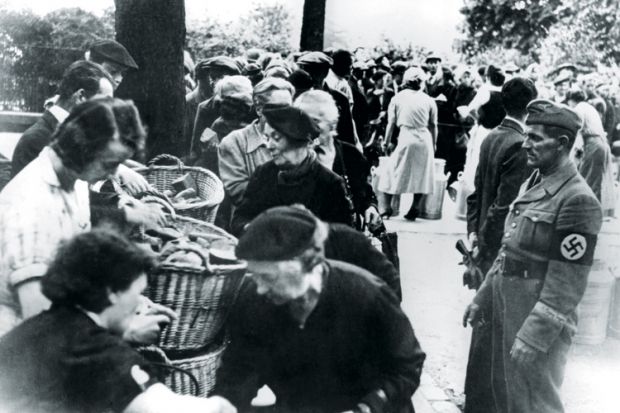In the 70 years since the end of the Second World War, the history of German-occupied France has veered between a celebration of French resistance, attested to by the existence of a Resistance museum in even the smallest provincial town, and a vilification of France as a nation of traitors, with its men volunteering to fight on the Eastern Front and its women taking part in “horizontal collaboration” in the bedroom.
David Drake’s new book helpfully muddies the waters, allowing us a fascinating glimpse into the daily lives of ordinary Parisians. Extensive use of diaries enables him to convey a sense of raw emotion usually absent from idealised post-war accounts. Young or old, male or female, Aryan or Jewish, Parisians experienced the occupation as a time of confusion, deprivation, frustration and fear – and also deep ambivalence. Had France been invaded by German barbarians or betrayed by the French government? Could one flirt with a Wehrmacht soldier while still hating les boches? Was wearing a yellow star an act of pride or humiliation? These questions troubled Parisians, but so did a far more simple one: will I have enough food and fuel to survive the winter?
Drake’s witnesses’ frank descriptions of deprivation are viscerally upsetting, despite the paucity of French rations being a well-established fact. More heart-rending still are the painfully human responses of Jews faced with arrest and deportation, even though France’s Jewish population fared considerably better than Jews elsewhere. Here, Drake demonstrates the power of well-executed micro- and testimonial-history. Yes, the Parisian diarists in this story are not totally representative – and Drake is upfront about that fact – because none were true collaborators. But their testimonies, together with insights into the personalities and ambitions of those who were collaborators, offer a rich and immediate history of both occupied Paris and occupied Parisians – and leaves the reader fearing for the fates of those for whom death seemed certain.
Parisians’ concomitant disinterest in and concern for their Jewish neighbours is also strangely moving. While few residents were brave (or interested) enough to wear mock yellow stars that defiantly proclaimed the wearers, variously, “Auvergnat” or “swing” rather than “Juif”, the adornment of ordinary men and women with this symbol provoked solidarity, not disgust, as the Germans hoped. Indeed, the story of Paris’ occupation is seemingly one of an easily triumphant force playing their hand wrong at every turn. Philippe Pétain, the Nazi-appointed leader of Vichy France, comes off as maddeningly obsequious, but it is the Germans’ constant overreaction and misreading of the Parisian mood that is their undoing. The savage directives from Berlin, ordering hostage-taking and executions, pushed a relatively apathetic population towards outright rebellion, leading many Parisians to fight for their liberation well before the Allies decided that Paris was important in their journey eastward.
The one disappointment is that Drake’s excellent narrative is let down by poor proofreading (to the extent that it appears as if several chapters were not proofed at all, so numerous are the grammatical errors therein) and several clunky transitions (a perfect cliffhanger ends with “more details are given further in this chapter”; a grim description of the round-up of Jews and Communists is followed, with no obvious linkage, by a section on the swing craze). An astute editor would have caught these and asked Drake to tighten his prose by 10 per cent. Hopefully Harvard University Press will address these problems for the paperback.
Victoria Harris is associate research fellow in history, Birkbeck, University of London.
Paris at War: 1939-1944
By David Drake
Harvard University Press, 592pp, £25.00
ISBN 9780674504813
Published 26 November 2015
Register to continue
Why register?
- Registration is free and only takes a moment
- Once registered, you can read 3 articles a month
- Sign up for our newsletter
Subscribe
Or subscribe for unlimited access to:
- Unlimited access to news, views, insights & reviews
- Digital editions
- Digital access to THE’s university and college rankings analysis
Already registered or a current subscriber?




